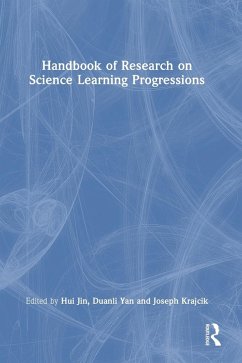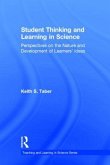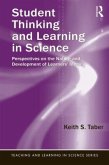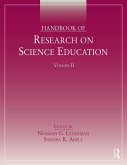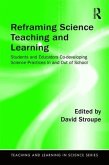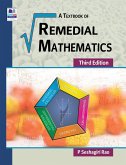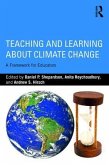Handbook of Research on Science Learning Progressions
Herausgeber: Jin, Hui; Krajcik, Joseph; Yan, Duanli
Handbook of Research on Science Learning Progressions
Herausgeber: Jin, Hui; Krajcik, Joseph; Yan, Duanli
- Gebundenes Buch
- Merkliste
- Auf die Merkliste
- Bewerten Bewerten
- Teilen
- Produkt teilen
- Produkterinnerung
- Produkterinnerung
Gathering contributions from leading scholars around the world, this handbook offers a comprehensive resource on the most recent advances in research surrounding the theories, methodologies, and applications of science learning progressions.
Andere Kunden interessierten sich auch für
![Student Thinking and Learning in Science Student Thinking and Learning in Science]() Keith S. TaberStudent Thinking and Learning in Science216,99 €
Keith S. TaberStudent Thinking and Learning in Science216,99 €![Student Thinking and Learning in Science Student Thinking and Learning in Science]() Keith S. TaberStudent Thinking and Learning in Science75,99 €
Keith S. TaberStudent Thinking and Learning in Science75,99 €![Handbook of Research on Science Education, Volume II Handbook of Research on Science Education, Volume II]() Handbook of Research on Science Education, Volume II194,99 €
Handbook of Research on Science Education, Volume II194,99 €![Reframing Science Teaching and Learning Reframing Science Teaching and Learning]() Reframing Science Teaching and Learning68,99 €
Reframing Science Teaching and Learning68,99 €![A Text Book of Remedial Mathematics A Text Book of Remedial Mathematics]() Rao Seshagiri PA Text Book of Remedial Mathematics150,99 €
Rao Seshagiri PA Text Book of Remedial Mathematics150,99 €![Children's Ways with Science and Literacy Children's Ways with Science and Literacy]() Children's Ways with Science and Literacy227,99 €
Children's Ways with Science and Literacy227,99 €![Teaching and Learning about Climate Change Teaching and Learning about Climate Change]() Teaching and Learning about Climate Change75,99 €
Teaching and Learning about Climate Change75,99 €-
-
-
Gathering contributions from leading scholars around the world, this handbook offers a comprehensive resource on the most recent advances in research surrounding the theories, methodologies, and applications of science learning progressions.
Hinweis: Dieser Artikel kann nur an eine deutsche Lieferadresse ausgeliefert werden.
Hinweis: Dieser Artikel kann nur an eine deutsche Lieferadresse ausgeliefert werden.
Produktdetails
- Produktdetails
- Verlag: Routledge
- Seitenzahl: 554
- Erscheinungstermin: 30. Juli 2024
- Englisch
- Abmessung: 260mm x 183mm x 34mm
- Gewicht: 1224g
- ISBN-13: 9780367773199
- ISBN-10: 0367773198
- Artikelnr.: 70141254
- Herstellerkennzeichnung
- Libri GmbH
- Europaallee 1
- 36244 Bad Hersfeld
- gpsr@libri.de
- Verlag: Routledge
- Seitenzahl: 554
- Erscheinungstermin: 30. Juli 2024
- Englisch
- Abmessung: 260mm x 183mm x 34mm
- Gewicht: 1224g
- ISBN-13: 9780367773199
- ISBN-10: 0367773198
- Artikelnr.: 70141254
- Herstellerkennzeichnung
- Libri GmbH
- Europaallee 1
- 36244 Bad Hersfeld
- gpsr@libri.de
Hui Jin is an associate professor of science education at Georgia Southern University, USA. Duanli Yan is the Director of Computational Research at ETS and adjunct professor at Fordham University, USA. Joseph Krajcik directs the CREATE for STEM Institute and is a University Distinguished Professor at Michigan State University, USA.
1. An Introduction to Science Learning Progression Research Section 1:
Learning Progression Theories and Methodologies 2. Cognitive Foundations of
Science Learning Progressions 3. On the Critiques of the Learning
Progression Research 4. Validity of learning progressions 5. Development
and Validation of Knowledge-In-Use Learning Progressions 6. Coordinating
Assessments with a Learning Progression 7. Learning Progression Approaches
Used in Germany 8. Learning Progression Approaches Used in China 9.
Implications of Mathematics Learning Trajectories for Science Education 10.
Commentary: Perspectives on Learning Progression Theories and Methodologies
Section 2: Learning Progressions to Promote Student Learning 11. Learning
Progressions in Genetics 12. Developing Three-Dimensional Learning
Progressions of Energy, Interaction, and Matter at Middle School Level: A
Design-Based Research 13. Rethinking Learning Progression for Energy 14.
Geology & Earth Systems Sciences Learning Progressions 15. Supporting
Curriculum Development with a Learning Progression for Matter-tracing
Investigations 16. Using a Learning Progression to Assess and Scaffold
Students' Explanations of Carbon-transforming Processes 17. Commentary:
Reflection on the Learning Progression Approach to Promoting Student
Learning Section 3: Curriculum, Instruction, and Teacher Learning 18. Key
Components of Learning Progression-Based Educative Curriculum Materials
Designed to Support Teachers and Their Diverse Students 19. Crosscutting
Concepts and Learning Progressions 20. Science Teacher Educators and
Science Teacher Learning Progressions: Resource, Roadmap, and
Representation 21. Learning progressions as supports for teachers'
formative assessment practices 22. Using learning progressions in
professional development programs 23. Learning Progressions and Youths'
Rightful Presence in Science 24. Commentary: Implications of Teachers'
Learning and Use of Learning Progressions Section 4: Applications of
Innovative Technology and Artificial Intelligence to Support Learning
Progressions 25. Dynamic Bayesian Models for Learning Progressions 26. The
Application of Automated Scoring Technology in Learning Progression
Assessment 27. Integrating Artificial Intelligence into Learning
Progression to Support Student Knowledge-in-Use: Opportunities and
Challenges 28. Using an AI-based dashboard to help teachers support
students' learning progressions for science practices 29. Commentary: The
role of technology in science learning progression
Learning Progression Theories and Methodologies 2. Cognitive Foundations of
Science Learning Progressions 3. On the Critiques of the Learning
Progression Research 4. Validity of learning progressions 5. Development
and Validation of Knowledge-In-Use Learning Progressions 6. Coordinating
Assessments with a Learning Progression 7. Learning Progression Approaches
Used in Germany 8. Learning Progression Approaches Used in China 9.
Implications of Mathematics Learning Trajectories for Science Education 10.
Commentary: Perspectives on Learning Progression Theories and Methodologies
Section 2: Learning Progressions to Promote Student Learning 11. Learning
Progressions in Genetics 12. Developing Three-Dimensional Learning
Progressions of Energy, Interaction, and Matter at Middle School Level: A
Design-Based Research 13. Rethinking Learning Progression for Energy 14.
Geology & Earth Systems Sciences Learning Progressions 15. Supporting
Curriculum Development with a Learning Progression for Matter-tracing
Investigations 16. Using a Learning Progression to Assess and Scaffold
Students' Explanations of Carbon-transforming Processes 17. Commentary:
Reflection on the Learning Progression Approach to Promoting Student
Learning Section 3: Curriculum, Instruction, and Teacher Learning 18. Key
Components of Learning Progression-Based Educative Curriculum Materials
Designed to Support Teachers and Their Diverse Students 19. Crosscutting
Concepts and Learning Progressions 20. Science Teacher Educators and
Science Teacher Learning Progressions: Resource, Roadmap, and
Representation 21. Learning progressions as supports for teachers'
formative assessment practices 22. Using learning progressions in
professional development programs 23. Learning Progressions and Youths'
Rightful Presence in Science 24. Commentary: Implications of Teachers'
Learning and Use of Learning Progressions Section 4: Applications of
Innovative Technology and Artificial Intelligence to Support Learning
Progressions 25. Dynamic Bayesian Models for Learning Progressions 26. The
Application of Automated Scoring Technology in Learning Progression
Assessment 27. Integrating Artificial Intelligence into Learning
Progression to Support Student Knowledge-in-Use: Opportunities and
Challenges 28. Using an AI-based dashboard to help teachers support
students' learning progressions for science practices 29. Commentary: The
role of technology in science learning progression
1. An Introduction to Science Learning Progression Research Section 1:
Learning Progression Theories and Methodologies 2. Cognitive Foundations of
Science Learning Progressions 3. On the Critiques of the Learning
Progression Research 4. Validity of learning progressions 5. Development
and Validation of Knowledge-In-Use Learning Progressions 6. Coordinating
Assessments with a Learning Progression 7. Learning Progression Approaches
Used in Germany 8. Learning Progression Approaches Used in China 9.
Implications of Mathematics Learning Trajectories for Science Education 10.
Commentary: Perspectives on Learning Progression Theories and Methodologies
Section 2: Learning Progressions to Promote Student Learning 11. Learning
Progressions in Genetics 12. Developing Three-Dimensional Learning
Progressions of Energy, Interaction, and Matter at Middle School Level: A
Design-Based Research 13. Rethinking Learning Progression for Energy 14.
Geology & Earth Systems Sciences Learning Progressions 15. Supporting
Curriculum Development with a Learning Progression for Matter-tracing
Investigations 16. Using a Learning Progression to Assess and Scaffold
Students' Explanations of Carbon-transforming Processes 17. Commentary:
Reflection on the Learning Progression Approach to Promoting Student
Learning Section 3: Curriculum, Instruction, and Teacher Learning 18. Key
Components of Learning Progression-Based Educative Curriculum Materials
Designed to Support Teachers and Their Diverse Students 19. Crosscutting
Concepts and Learning Progressions 20. Science Teacher Educators and
Science Teacher Learning Progressions: Resource, Roadmap, and
Representation 21. Learning progressions as supports for teachers'
formative assessment practices 22. Using learning progressions in
professional development programs 23. Learning Progressions and Youths'
Rightful Presence in Science 24. Commentary: Implications of Teachers'
Learning and Use of Learning Progressions Section 4: Applications of
Innovative Technology and Artificial Intelligence to Support Learning
Progressions 25. Dynamic Bayesian Models for Learning Progressions 26. The
Application of Automated Scoring Technology in Learning Progression
Assessment 27. Integrating Artificial Intelligence into Learning
Progression to Support Student Knowledge-in-Use: Opportunities and
Challenges 28. Using an AI-based dashboard to help teachers support
students' learning progressions for science practices 29. Commentary: The
role of technology in science learning progression
Learning Progression Theories and Methodologies 2. Cognitive Foundations of
Science Learning Progressions 3. On the Critiques of the Learning
Progression Research 4. Validity of learning progressions 5. Development
and Validation of Knowledge-In-Use Learning Progressions 6. Coordinating
Assessments with a Learning Progression 7. Learning Progression Approaches
Used in Germany 8. Learning Progression Approaches Used in China 9.
Implications of Mathematics Learning Trajectories for Science Education 10.
Commentary: Perspectives on Learning Progression Theories and Methodologies
Section 2: Learning Progressions to Promote Student Learning 11. Learning
Progressions in Genetics 12. Developing Three-Dimensional Learning
Progressions of Energy, Interaction, and Matter at Middle School Level: A
Design-Based Research 13. Rethinking Learning Progression for Energy 14.
Geology & Earth Systems Sciences Learning Progressions 15. Supporting
Curriculum Development with a Learning Progression for Matter-tracing
Investigations 16. Using a Learning Progression to Assess and Scaffold
Students' Explanations of Carbon-transforming Processes 17. Commentary:
Reflection on the Learning Progression Approach to Promoting Student
Learning Section 3: Curriculum, Instruction, and Teacher Learning 18. Key
Components of Learning Progression-Based Educative Curriculum Materials
Designed to Support Teachers and Their Diverse Students 19. Crosscutting
Concepts and Learning Progressions 20. Science Teacher Educators and
Science Teacher Learning Progressions: Resource, Roadmap, and
Representation 21. Learning progressions as supports for teachers'
formative assessment practices 22. Using learning progressions in
professional development programs 23. Learning Progressions and Youths'
Rightful Presence in Science 24. Commentary: Implications of Teachers'
Learning and Use of Learning Progressions Section 4: Applications of
Innovative Technology and Artificial Intelligence to Support Learning
Progressions 25. Dynamic Bayesian Models for Learning Progressions 26. The
Application of Automated Scoring Technology in Learning Progression
Assessment 27. Integrating Artificial Intelligence into Learning
Progression to Support Student Knowledge-in-Use: Opportunities and
Challenges 28. Using an AI-based dashboard to help teachers support
students' learning progressions for science practices 29. Commentary: The
role of technology in science learning progression

